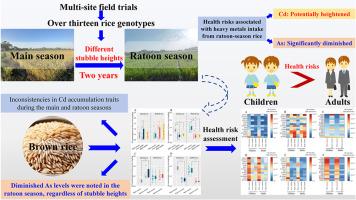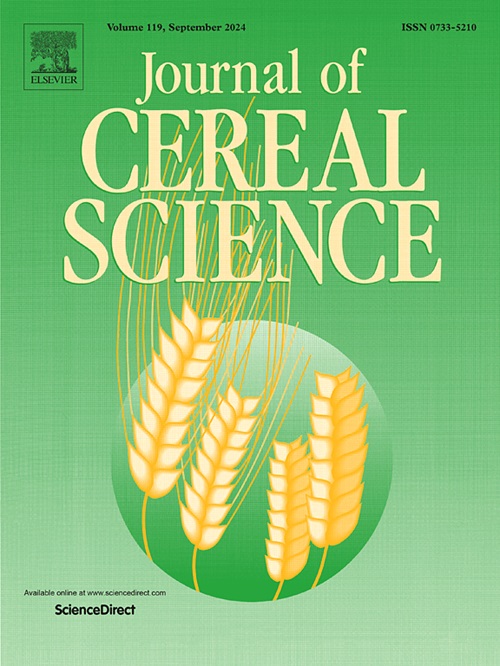Variation in Cd and As accumulation and health risk in rice-ratoon cropping system: Evidence from two-year field trials involving multiple cultivars in southern China
IF 3.9
2区 农林科学
Q2 FOOD SCIENCE & TECHNOLOGY
引用次数: 0
Abstract
The abbreviated growth period associated with ratooning, approximately half that of the main season, raises questions about a potential decrease in cadmium (Cd) and arsenic (As) levels in ratoon rice grains. We conducted multi-site field trials with 25 rice varieties spanning two years. Cd levels in ratoon-season rice did not significantly decrease, with some varieties showing a notable increase in Cd levels compared with those in the main season. Some varieties with low Cd accumulation in the main season showed an increase in Cd levels in the ratoon season; however, As levels decreased during the ratoon season for all varieties. Consuming ratoon-season rice could pose increased health risks due to higher Cd levels. Conversely, consuming ratoon-season rice significantly reduced As-related health risks by 3.11–73.87%. Although this decrease in As levels during the ratoon season may provide reassurance, caution should be exercised regarding the potential increase in Cd levels in ratoon-season rice grown in contaminated areas caused by varietal differences, which could lead to elevated health risks. Conclusively, two inbred varieties (XZX45 and ZJZ17) and one hybrid (WLYHZ) variety were identified as suitable for cultivation in mildly to moderately contaminated areas, mitigating the associated health risks.

水稻-芸苔作物系统中镉和砷的积累差异与健康风险:来自中国南方多品种两年田间试验的证据
晚稻的生长期较短,约为正季的一半,这就引发了晚稻谷粒中镉(Cd)和砷(As)含量可能下降的问题。我们对 25 个水稻品种进行了为期两年的多点田间试验。与主季水稻相比,育秧期水稻的镉含量并没有明显下降,有些品种的镉含量还明显增加。一些主季镉累积量较低的品种,其生长季的镉含量有所增加;然而,所有品种生长季的砷含量都有所下降。由于镉含量较高,食用反季节大米可能会增加健康风险。相反,食用育秧期大米可显著降低与砷有关的健康风险,降幅在 3.11-73.87% 之间。虽然反季节水稻中砷含量的降低可能会让人放心,但应注意的是,在受污染地区种植的反季节水稻中,由于品种差异,镉含量可能会增加,从而导致健康风险升高。最终,两个近交系品种(XZX45 和 ZJZ17)和一个杂交品种(WLYHZ)被确定为适合在轻度至中度污染地区种植,从而降低了相关的健康风险。
本文章由计算机程序翻译,如有差异,请以英文原文为准。
求助全文
约1分钟内获得全文
求助全文
来源期刊

Journal of Cereal Science
工程技术-食品科技
CiteScore
7.80
自引率
2.60%
发文量
163
审稿时长
38 days
期刊介绍:
The Journal of Cereal Science was established in 1983 to provide an International forum for the publication of original research papers of high standing covering all aspects of cereal science related to the functional and nutritional quality of cereal grains (true cereals - members of the Poaceae family and starchy pseudocereals - members of the Amaranthaceae, Chenopodiaceae and Polygonaceae families) and their products, in relation to the cereals used. The journal also publishes concise and critical review articles appraising the status and future directions of specific areas of cereal science and short communications that present news of important advances in research. The journal aims at topicality and at providing comprehensive coverage of progress in the field.
 求助内容:
求助内容: 应助结果提醒方式:
应助结果提醒方式:


